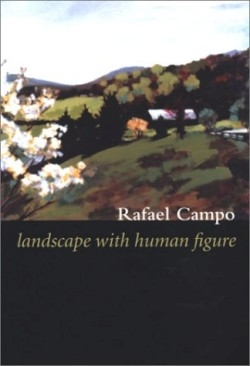Landscape With Human Figure
In his forceful long poem in eight parts, “Quatrains for a
Shrinking World,“ the author writes: “but I am merely Cuban, dark and small / as any from a hundred nations which / exists for others’ domination.” Later in the poem he addresses the American flag: “Saluting it, I half-forgot I was / a fag, a spic, a goddamn immigrant- / it was so beautiful for spacious skies / I thought that even I was maybe meant // to be a part of it.”
The social commentary in these poems is vital, and more than a soap box. Campo uses strong words to speak of what needs to be spoken of, which includes being a brown person and not feeling at home “no matter where I go.”
The overtly political poems are more striking than some of the love poems, which lean toward sentimentality. It is a pleasure to read words that do not hesitate or skirt around tough issues. Campo is clear and direct about what it means to him to be Cuban, gay, a poet. A practicing physician, he also writes about the hospital, illness, and caregiving. In some poems, what stands out is the lack of care, and the pure rote of the job of answering to patient’s needs.
A black man in the ER waits for me.
I take my time, because the sign-out says
he’s homeless, alcoholic, probably
a shooter too, complaining of three days
of headache.
Campo is an assistant professor of medicine at Harvard Medical School, and has numerous publications to his credit, many of them award-winning, including What the Body Told and a collection of essays, The Poetry of Healing: A Doctor’s Education in Empathy, Identity and Desire. A previous book of his poems, Diva, won the 2000 National Book Circle Award.
In the final poem of this collection, Campo’s words are almost prophetic: “To the wind: remember us. Who’s not to say / the airplane roaring overhead in fact / is Armageddon? The wind is cool today, a kind of calm before the last attack.” Dark as it is, the poem compels one back through the book, to look for answers and to look for questions. These are the impulses that drive so many poets-and readers of poetry-forward. This collection belongs to that tradition of inquiry and reflection.
Reviewed by
Holly Wren Spaulding
Disclosure: This article is not an endorsement, but a review. The publisher of this book provided free copies of the book to have their book reviewed by a professional reviewer. No fee was paid by the publisher for this review. Foreword Reviews only recommends books that we love. Foreword Magazine, Inc. is disclosing this in accordance with the Federal Trade Commission’s 16 CFR, Part 255.

